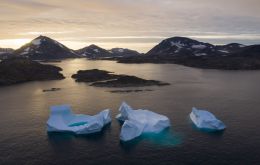MercoPress. South Atlantic News Agency
Tag: Greenland
-
Monday, January 26th 2026 - 10:15 UTC
Global opposition to U.S. policy gains momentum after Davos confrontations

Global opposition to United States foreign and trade policies has intensified in the wake of sharp confrontations at the World Economic Forum in Davos 2026, with leaders from Europe, Asia, and Latin America pushing back against unilateral U.S. initiatives, including strategic pressure tactics.
-
Thursday, January 22nd 2026 - 09:38 UTC
Trump says “framework” deal with NATO on Greenland is taking shape and drops tariff threat

US President Donald Trump said his administration has agreed with NATO Secretary General Mark Rutte on a “framework” for a potential understanding covering Greenland and the wider Arctic region, and announced he would pull back a tariff threat aimed at several European allies. Trump offered no operational detail, but framed the talks as a solution that would benefit the United States and NATO as a whole.
-
Thursday, January 22nd 2026 - 00:01 UTC
Why Trump is obsessed with Greenland and why Canada's staying out of it

By Gwynne Dyer - After the Danish and Greenland foreign ministers came out of a meeting in Washington on last week convinced that Donald Trump really intended to seize Greenland, things moved very fast.
-
Tuesday, January 20th 2026 - 18:09 UTC
Macron warns Davos of a “world without rules” as Trump’s Greenland row intensifies

French President Emmanuel Macron told the World Economic Forum in Davos on Tuesday that the world is drifting toward a “world without rules,” where the law of “the strongest” prevails—remarks delivered against the backdrop of a deepening transatlantic dispute over Donald Trump’s push to secure control of Greenland and his fresh tariff threats.
-
Tuesday, January 20th 2026 - 03:39 UTC
Trump links Greenland ambitions to Nobel snub ahead of Davos appearance

US President Donald Trump reignited tensions with European allies on Monday by linking his push for control of Greenland to the Nobel Peace Prize — arguing that, because he did not receive the award, he no longer feels “obliged to think only about peace.” In a message addressed to Norwegian Prime Minister Jonas Gahr Støre —later circulated to European embassies in Washington— Trump pivoted from the Nobel grievance to Greenland, saying the world would not be safe without “total and absolute” US control of the Arctic island.
-
Saturday, January 10th 2026 - 10:24 UTC
Trump wants Greenland at any cost

US President Donald Trump insisted on Friday that his administration needed to take effective control of Greenland because otherwise Moscow or Beijing would do it. “By hook or by crook,” Washington needs to prevent it from falling under the influence of Russia or China, Trump explained to reporters at the White House.
-
Thursday, June 12th 2025 - 09:42 UTC
Record high temperatures hit Greenland and Iceland, Copernicus Observatory warns

Greenland experienced a melting rate 17 times faster than average last month due to record-high temperatures, while Iceland saw temperatures exceed 26°C, the European Copernicus Observatory reported this week.
-
Monday, December 30th 2024 - 09:36 UTC
Trump’s long late and lost attempt to take over Greenland

By Gwynne Dyer - From his purchase of New Jersey casinos to his proposed acquisition of Greenland, Donald Trump’s real estate deals have always been plagued by bad timing. The United States could probably have bought Greenland from Denmark in 1917 (when it did buy the U.S. Virgin Islands from the Danes), but he’s a century too late now.
-
Monday, August 7th 2023 - 10:49 UTC
Why Antarctic winter ice, the size of Greenland, is missing?

Winter sea ice in the Antarctic is at a historic low, and scientists are working to understand why an area of ice the size of Greenland is missing. Scientists from British Antarctic Survey have been active in the media offering commentary on this extreme event.
-
Tuesday, May 18th 2021 - 09:01 UTC
Study shows Greenland ice melting might become irreversible soon

A new study released Monday by the German Potsdam Institute for Climate Impact Research (PIK) has warned that due to the rising temperatures, the destabilization of icy central-western areas of Greenland has already begun and that melting could then continue in the current global warming scenario.
